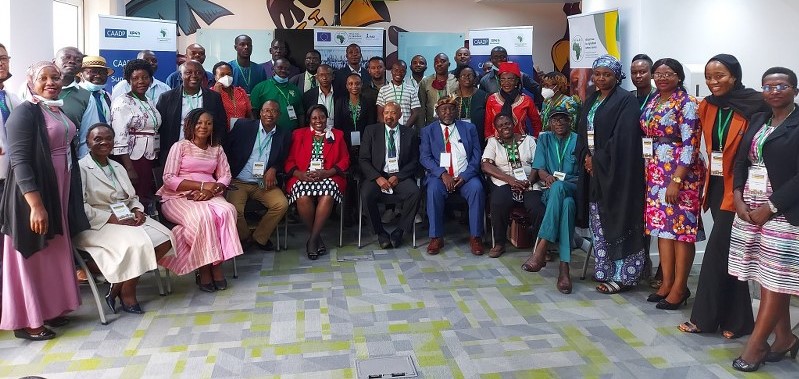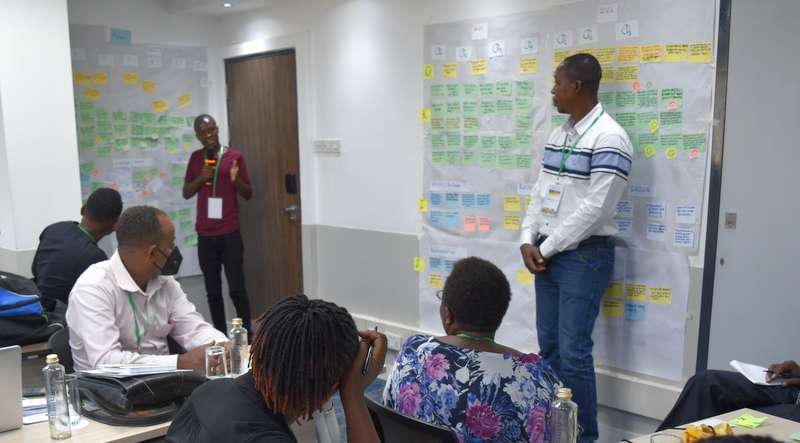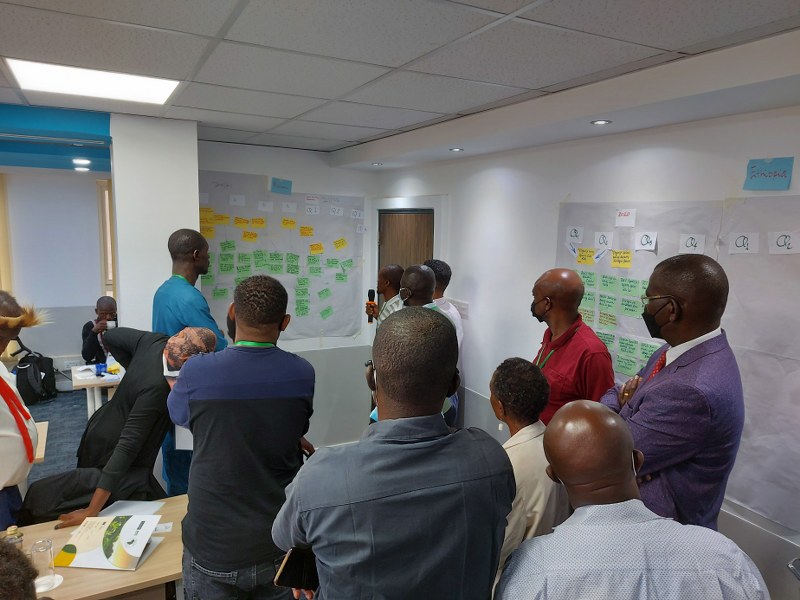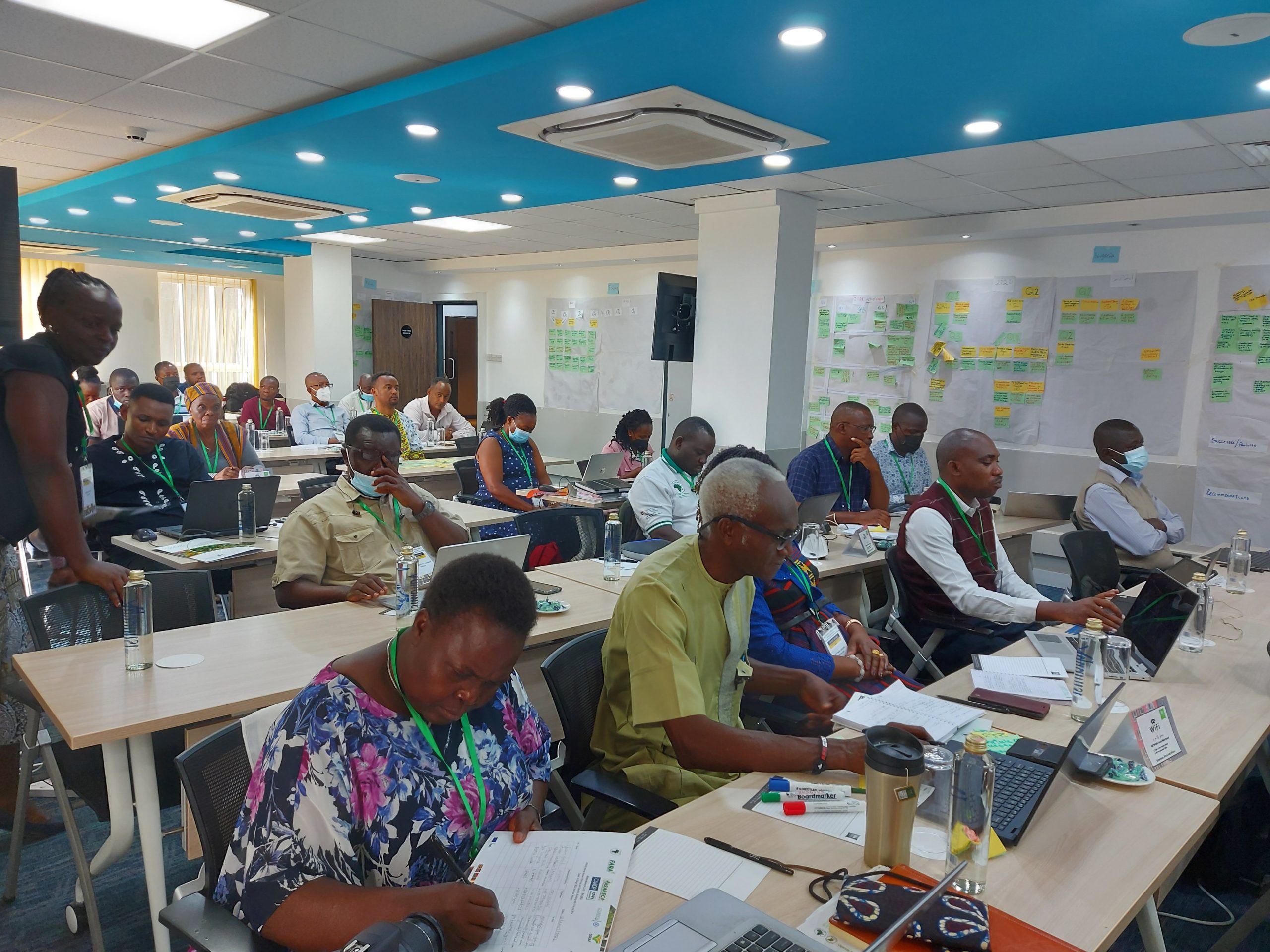
Nairobi Kenya: The African Forum for Agricultural Advisory Services (AFAAS) with support from the European Commission held an Internal review, planning and capacity development training workshop for its staff, CAADP-XP4 key implementing Country Fora and Technical Working Groups.
The long week event that kicked off on the 9th, April 2022, at Nairobi Kenya brought together eleven country fora namely Cameroon, Ethiopia, Ghana, Kenya, Liberia, Madagascar, Mali, Malawi, Nigeria, South Africa and Uganda.
The purpose of this workshop was to Review key achievements, lessons and challenges of the CAADP XP4 project, Design and plan the next activities and implementation framework for the year 2022 and beyond, Train Gender Experts and update the AFAAS Gender Strategy and operationalize a framework for the AFAAS Gender Community of Practice as well as Consult on AFAAS and Country Fora Value Proposition
In his welcome remarks, Dr. Silim Nahdy, the Executive Director AFAAS, assured the participants that despite the COVID-19 pandemic, AFAAS and its network had achieved a great result in the implementation of the CAADP-XP4 Programme. He also acknowledged the Country Fora for their continuous support towards the implementation and achievement of the CAADP-XP4 goals.
“we want to thank you the country fora for your engagement and active collaborations towards implementing the CAADP-XP4 and other projects through the guidance of the secretariat.”
Mrs. Mary Kamau, AFAAS Board member reiterated that the CAADP-XP4 program is the main program that AFAAS has and there is more need for strengthening the capacity with regional networks as well as the need to look at the indigenous Knowledge and help the farmers get out of the poverty trip.
She further acknowledged the great role played by the Country Fora and urged them not to forget about policy. “The CFs are very instrumental in the Agricultural development. We can’t forget about policy. We have TAP common framework that come with policies that are favorable to Agricultural Development “
The workshop was also graced with the presence of Ms. Pauline Kamau, the Senior Strategy Officer, Professor Rufaro Madakadze and Dr. Qureish Noordin from the Extension and Capacity Building Unit at AGRA Alliance who shared with the AFAAS stakeholders on their experiences on the extension Village Based Agent Model (VBAs) and the AGRA draft strategy.
Experiences were drawn from all the country fora and regional fora in order to review project achievements status, document lessons and plan the next activities.
ORID Methodology

During the workshop, The ORID facilitation framework was used to review progress, challenges and lessons . The ORID method uses four levels of questioning with each level building on previous levels. Each of the CFs was made aware of factual data and encourages expressing their own emotions/reactions to these facts to analyze/reflect and decide the way forward.
According to Dr. Samson Eshetu, the Capacity Development Specialist, ORID stands for Objective, Reflection, Interpretation and Decision where country fora and regional fora are expected to identify what happened within the years of CAADP-XP4 implementation period (2020 and 2021) and key achievements for the period using the timeline tool.
 “In the Reflective stage, the CFs and RFs are asked to Reflect on the timeline showing the activities conducted and achievements, while at the Interpretative stage, participants jointly make sense of what changes/results were observed hence able to identify reasons for successes and challenges and then finally, be able to decide on what needs to be changed and forward recommendations, action areas in the form of action plans. “
“In the Reflective stage, the CFs and RFs are asked to Reflect on the timeline showing the activities conducted and achievements, while at the Interpretative stage, participants jointly make sense of what changes/results were observed hence able to identify reasons for successes and challenges and then finally, be able to decide on what needs to be changed and forward recommendations, action areas in the form of action plans. “
Notably, the Comprehensive Africa Agriculture Development Programme EX Pillar 4 (CAADP-XP4) Project under the DeSIRA program is financed by the European Union and managed by the International Fund for Agricultural Development (IFAD). Spanning a duration of 57 months from March 2019 to December 2023, the project is implemented by a consortium of five organizations in the agricultural research and innovation landscape, namely: the African Forum for Agricultural Advisory Services (AFAAS), Forum for Agricultural Research in Africa (FARA). the Association for Strengthening Agricultural Research in Eastern and Southern Africa (ASARECA), the Centre for Coordination of Agricultural Research and Development for Southern Africa (CCARDESA), and the West and Central African Council for Agricultural Research and Development (CORAF).
The project supports a science and innovation-led and climate-relevant agricultural transformation in Africa, by strengthening the capacities of the five organizations (AFAAS, ASARECA, CCARDESA, CORAF, and FARA) to deliver on their Agricultural Research for Development (AR4D) mandate and to collectively support African countries implement relevant Programmes of the Comprehensive Africa Agriculture Development Programme (CAADP). The project espouses the tenets of joint implementation as a means of enhancing the collaborative capacities of the 5 sister organizations.
Furthermore, AFAAS organized a side event on “Gender Integration in Agricultural Advisory Services”
The objectives of the side event was to appreciate the changes in the AEAS operating context and position the Extensionist for effective service delivery in Agricultural Innovation System (AIS), Develop a common understanding of gender concepts and strengthen integration of gender in Programmes, projects and institutions, Review and update the AFAAS Gender Main streamIng strategy and develop priorities for gender actions at continent and country level, Constitute and institutionalize the AFAAS Gender Community of Practice with clear terms of reference for implementation.
 AFAAS commitment to gender dates to its Strategic Plan 2011–2015, which was cognizant of the linkages between social exclusion and general poverty as key deterring factors limiting the realization of agriculture’s full potential as the engine for Africa’s economic development. In 2014, AFAAS commissioned seven country scoping studies on gender-responsive approaches to rural advisory services (RAS) in Africa. The aim of the studies was to collect secondary data on existing policies, Programmes, approaches, and tools embedded with gender-responsive characteristics in their provision of RAS to farmers, with specific focus on women and youth. AFAAS also developed the Gender Mainstreaming Strategy 2015-2019 to support the processes of promoting gender equality in AEAS provision on the continent.
AFAAS commitment to gender dates to its Strategic Plan 2011–2015, which was cognizant of the linkages between social exclusion and general poverty as key deterring factors limiting the realization of agriculture’s full potential as the engine for Africa’s economic development. In 2014, AFAAS commissioned seven country scoping studies on gender-responsive approaches to rural advisory services (RAS) in Africa. The aim of the studies was to collect secondary data on existing policies, Programmes, approaches, and tools embedded with gender-responsive characteristics in their provision of RAS to farmers, with specific focus on women and youth. AFAAS also developed the Gender Mainstreaming Strategy 2015-2019 to support the processes of promoting gender equality in AEAS provision on the continent.
Dr. Silim Nahdy highlighted that there are Frameworks both at national and continental level although some of them are not being implemented hence need to see how best to integrate gender into AEAS and also reach out to the grassroots.
Additional, Mr. Max Olupot the Director of Programmes, noted that AFAAS was looking forward to forming a continental sustainable gender community of practice which will be part of the CoP under the Global Forum for Rural Advisory Services (GFRAS).
From the gender lens, Dr. Patricia Bamanyaki, the AFAAS gender consultant, reiterated how important it is to harmonize the understanding of the gender concept. “There is need to track all the country fora as far as gender equality, equity, social inclusion and youth engagement since it will help in the development of a continental gender strategy as well as have its Impacts felt on the ground”
The gender side event attracted gender experts across the continent comprising of University professors, senior government officials represented from private organizations, private sector and gender champions.
Indeed, the gender expert side event reignited AFAAS gender lens in its programming.
